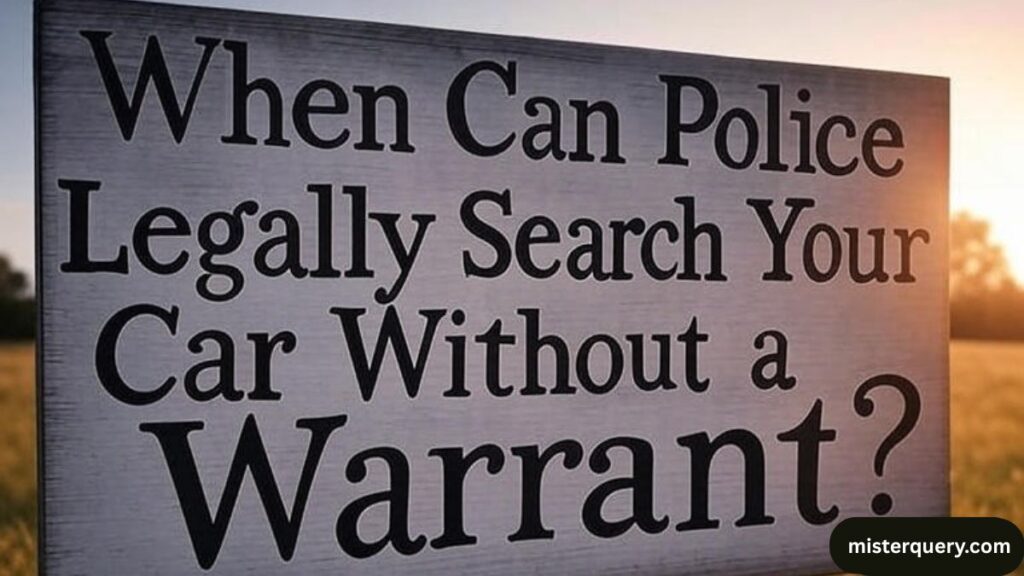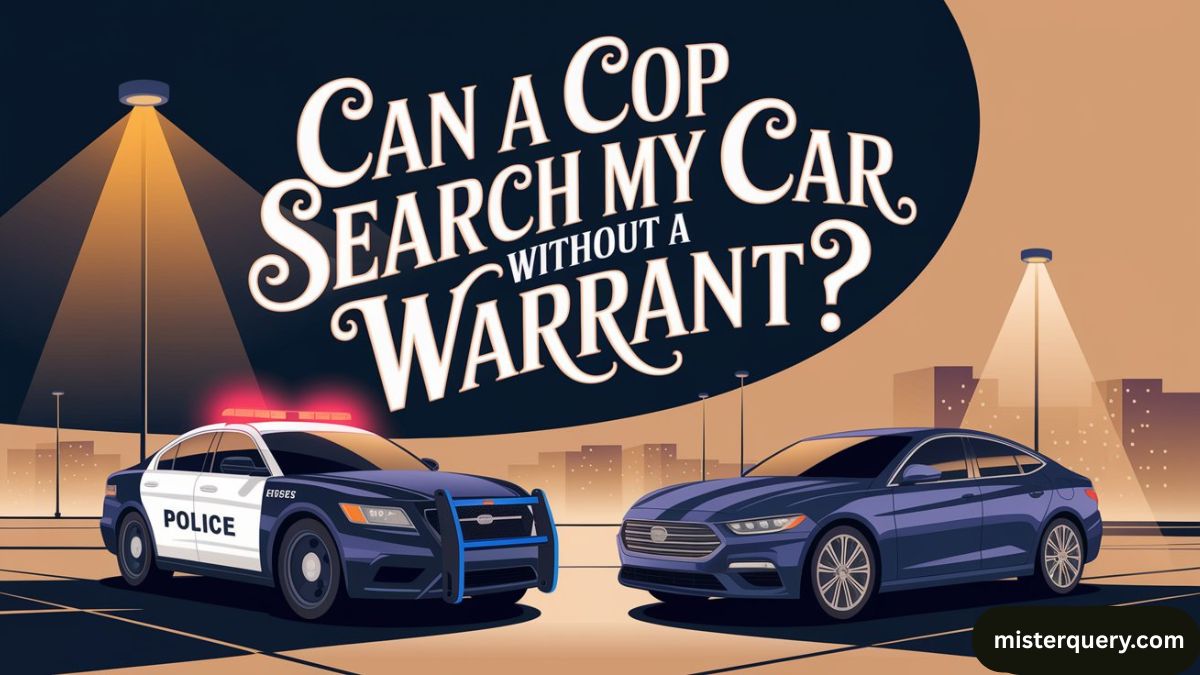Getting pulled over by law enforcement can be unsettling, especially when they ask to search your vehicle. Many drivers wonder, can a cop search my car without a warrant? The answer depends on several legal factors, including your rights under the Fourth Amendment protections. While some situations allow a warrantless vehicle search, not every traffic stop justifies one. Knowing the vehicle search exceptions can help you protect yourself from an unlawful car search. Officers often rely on probable cause car search or your consent, but that doesn’t always make the search legal. In this guide, we’ll explore when police can search your car and what to do if your rights are violated.
1. Understanding Your Fourth Amendment Rights
The Fourth Amendment protections guard people against unreasonable searches. That means the police can’t just stop your car and look inside without reason. But vehicles are not the same as homes. Because of their mobility, courts say there’s a reduced expectation of privacy in cars. This allows some warrantless vehicle search actions.
Still, the legal basis for vehicle searches must be strong. If the officer can’t explain why the search was needed, it may lead to a suppression hearing in court. That hearing decides if the search was valid or not. The outcome may result in suppression of evidence.
Related: Can a Locksmith Make a Car Key? Complete Guide for the USA
2. When Can Police Legally Search Your Car Without a Warrant?
You might wonder, can an officer search your car without a warrant just because they feel like it? The answer is no. But there are exceptions to the warrant requirement. Courts accept a few situations where police can search a vehicle on the spot.
For example, if there’s a strong DUI vehicle search reason or a dangerous object in plain sight, the police may act fast. Officers may also act when they fear for safety or believe evidence might be destroyed. These exceptions fall under what courts call exigent circumstances vehicle search.

Read Also: Where Can I Park My Car Overnight in the USA?
3. Consent-Based Searches
If a police officer asks, “Can I search your car?” and you say yes, that’s called a consent to search vehicle. You have the right to say no. The consent must be voluntary. If the officer forces you, the search may be challenged.
Remember, anything found during a warrantless vehicle search with your permission can be used as evidence. The courts take consent seriously. If you feel pressured or scared, it’s better to politely decline. Knowing your traffic stop rights can protect you.
Related: How Can I Get Tree Sap Off My Car (USA Guide)
4. Probable Cause and Vehicle Searches
What is probable cause? It means the police believe there is a real reason to search. For example, if they see a weapon, smell drugs, or spot something illegal, that gives probable cause car search.
This is part of the vehicle exception to the Fourth Amendment. It lets officers act fast without a judge. But they need specific facts for search justification. Just a hunch is not enough. This rule helps prevent unlawful car search cases.
Related: How Can I Get Tree Sap Off My Car (USA Guide)
5. Search Incident to Arrest
If you are arrested during a stop, the police can search your car. This is called a search incident to arrest. It must connect to the reason for your arrest. For example, if you’re arrested for drugs, they may look for more in your car.
The search must happen soon after the arrest. Also, it must relate to safety or evidence. This type of vehicle search exception is allowed even without a warrant. Still, there are limits, and each case is different.
Read More: Can the Police Legitimately Search My Vehicle Without a Warrant?
6. Other Common Exceptions to Warrant Requirement
Besides consent and probable cause, there are other reasons police can search. These include the plain view doctrine, the plain smell during a stop, and the hot pursuit doctrine.
There are also the border search exception and emergency exceptions to warrants. For example, if the car is near a border or police are chasing a suspect, they may not need a warrant. These fall under exigent circumstances vehicle search.
7. Police Searches of Impounded Vehicles
When police take your car after an arrest or accident, they may do an inventory search. This kind of impounded car search helps protect the owner’s property and prevent false claims.
But even these searches have rules. Officers must follow clear procedures. If they don’t, it can be an illegal search and seizure. That’s why it’s key to ask about your car’s status if it gets impounded.
8. When Probable Cause Does Not Apply
Sometimes the police say they had probable cause, but they didn’t. This happens when there is only a reasonable suspicion traffic stop, which is not enough to search the car.
The difference between probable cause and reasonable suspicion is important. Suspicion might justify stopping your car. But it doesn’t give the right to search it. Courts often look at facts to check if the officer’s actions were fair.
9. How to Challenge an Unlawful Vehicle Search
If you believe the police searched your car illegally, you can fight it. The best way is by filing a motion to suppress evidence. In California vehicle search laws, this is called a Penal Code 1538.5 motion.
Your lawyer for unlawful vehicle search can help you prepare for court. If the judge agrees the search was unfair, the evidence may be thrown out. This is called challenging a warrantless search, and it often helps win cases or reduce charges.
10. Get Legal Help if Your Rights Were Violated
The law is complex. If you feel your rights were violated during a warrantless vehicle search, speak with a criminal defense attorney for unlawful search. They know the police car search laws in the U.S. and can defend your case.
Legal help is especially important if you’re facing charges. A good lawyer can file the right motions, find the truth, and argue your case in court. Protecting your rights starts with asking for help.
Final Thoughts: Can Police Search My Car Without a Warrant in California?
Yes, sometimes they can. But not always. Knowing when they can, and when they can’t, makes all the difference. Whether it’s probable cause car search, inventory search, or search incident to arrest, you should understand your rights.
Always stay calm, ask questions, and talk to a lawyer if you’re unsure. Understanding your protections helps you stay safe and in control.
Table: Quick Comparison of Legal and Illegal Searches
| Scenario | Legal Search? | Reason |
|---|---|---|
| You give permission | Yes | Consent to search vehicle |
| Officer smells drugs | Yes | Plain smell during a stop |
| Car is impounded after arrest | Yes | Inventory search |
| Officer just has a gut feeling | No | Lacks specific facts for search justification |
| You’re stopped but not arrested | No | Only reasonable suspicion traffic stop |
Quote:
“The Fourth Amendment is not a suggestion. It is a constitutional right. Know it. Use it. Defend it.”
If you need help now, don’t wait. Speak to a legal expert who can explain your next steps. Knowing your rights is the best defense against unlawful searches.
11. FAQs
On what grounds can a police officer search your car?
A police officer can search your car if you give consent, they have probable cause, you’re arrested, or under specific legal exceptions.
Can police track your car without a warrant?
Generally, police need a warrant to track your car using GPS unless urgent circumstances apply.
Do I have to exit my vehicle for police?
Yes, if a police officer lawfully instructs you to exit your vehicle, you are legally required to comply.
How do you know if police are looking for your car?
You might receive a notice, be contacted directly, or find your vehicle listed in law enforcement databases or alerts.


